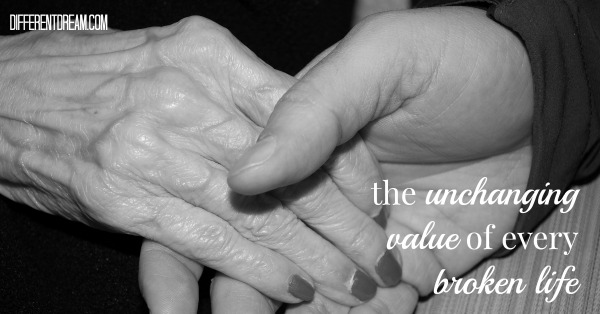The Caregiver’s Treasure

This morning, in the chilly half dark, I passed the houses along the route that leads to my favorite path. The acrid odor of burning electrical wires grew strong when I neared a ramshackle, uninhabited house that is the neighborhood eyesore. Yellow fire scene tape, barely visible in the dim light, stretched along the chain link fence surrounding the property, and I resolved to retrace my steps and get a better look near the end of my walk.
The clear light of day revealed the extent of the damage. The roof of the small, ranch house had caved in. Two sides of the house were burned away. The interior walls had collapsed. The house’s contents were unrecognizable, melted lumps of goo.
Yesterday, when I walked by, the house had been standing–in need of paint, sporting several broken windows, the yard shaggy and neglected–but it was still there.
This morning it is gone.
Dead.
Finished.
I am once again aware of how quickly and completely life can change.
I stared at the house and thought of when I first learned that lesson: the day my father died. For 38 years, my mother, my siblings and I watched multiple sclerosis rob Dad of the ability to walk, to write, to read, to control his bodily functions, to think clearly, to speak, and to feed himself.
The changes were small and incremental, sometimes barely discernible. They came so slowly and so gradually that for years it felt like nothing would ever change. Dad was trapped in a body that continually betrayed him. We were in limbo, waiting for the end we all knew was coming. But when he began to struggle to swallow, we knew the end was near.
On Sunday, Dad was fine when I took my 7-year-old daughter to read a story to him.
On Monday night, we received a call that Dad was running a fever.
On Tuesday, he died before noon.
One day Dad was there–his body compromised, his mind weakened, his spirit calm–but he was there.
The next day, he was dead.
His life was finished.
He was gone.
I experienced, for the first time, how quickly and completely life can change.
I stared at the burned out shell of the house. When the officials complete their inspection of the fire scene, there will be little for the demolition crew to do but cart away the rubble and smooth the ground. The house will be gone forever.
But, I realized, the same can not be said about Dad. My father is still here. He is part of who I am. Because of him, my perception of what constitutes a good life is quite different from the world’s view of a life well-lived.
For caregivers, a good life isn’t measured in major accomplishments–
Races won.
Money earned.
National acclaim.
Education achieved.
For caregivers, a life well-lived is measured in the small things–
A delayed milestone reached.
A tender moment shared.
The squeeze of a hand.
A fleeting smile of recognition.
These are the things Jesus teaches his people to treasure.
These are the things that matter.
This is the jewel caregivers carry with them when their loved one lives and when their loved one dies–
the unchanging value of every broken life.
Do you like what you see at DifferentDream.com? You can receive more great content by subscribing to the quarterly Different Dream newsletter and signing up for the daily RSS feed delivered to your email inbox. You can sign up for the first in the pop up box and the second at the bottom of this page.
By Jolene
Jolene Philo is a published author, speaker, wife, and mother of a son with special needs.
Subscribe for Updates from Jolene
Related Posts
God’s Power Is More than Sufficient to Answer our Prayers
Guest blogger Mark Arnold demonstrates that God’s power is more than sufficient to answer our prayers for our kids.
Emotions Are Information: A New Way to View and Interpret Big Feelings
Jolene explains the revelation she had about interpreting feelings as a special needs parent: emotions are information.
We’re Proud of our Kids with Special Needs!
Guest blogger Steve Harris takes a time out to remind us how true it is that we’re proud of our kids with special needs.






0 Comments